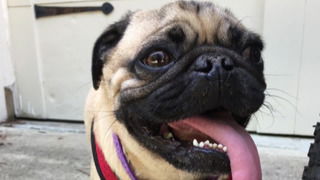N.C. pug tests positive for virus that causes COVID-19; first known case in a dog in the US

Click here for updates on this story
CHAPEL HILL, N.C. (WRAL) — A Chapel Hill family’s dog has tested positive for coronavirus.
The family was involved in a study at Duke in which the mother, father and son tested positive for COVID-19. During this study, the family had their pets tested and found out their pug, Winston, had coronavirus.
Dr. Chris Woods, the principal investigator of the Duke study, said, “The virus that causes COVID-19 was detected,” and he believes it’s the first known positive case in a dog in the United States.
The family’s mother, Heather McLean, is a pediatrician at Duke. She said their dog was experiencing mild symptoms. “Pugs are a little unusual in that they cough and sneeze in a very strange way. So it almost seems like he was gagging, and there was one day when he didn’t want to eat his breakfast, and if you know pugs you know they love to eat, so that seemed very unusual,” she said.
“(The dog) licks all of our dinner plates and sleeps in my mom’s bed, and we’re the ones who put our faces into his face. So, it makes sense that he got (coronavirus),” said McLean’s son, Ben.
The McLeans have four pets: two dogs, a cat and a lizard. The family said the dogs and cat were tested and only Winston tested positive.
They took part in the Molecular and Epidemiological Study of Suspected Infection (MESSI) research study on April 1. “They all came out to our house and did blood samples,” McLean said of the study. “For the humans, they swabbed our noses as well as our mouths, and for the animals they did oral swabs for both dogs and the cat.”
McLean’s daughter, Sydney, was the only member of the family not to test positive for COVID-19. The family’s father, Samuel, works in the emergency room at UNC Hospitals.
The family said Winston was only sick for a few days and is doing much better.
“Hopefully we’ll learn more through the research study, and I think because there’s not a lot of studies and sampling pets, we just don’t know yet. My advice is just not to get too worried about it,” McLean said.
Please note: This content carries a strict local market embargo. If you share the same market as the contributor of this article, you may not use it on any platform.
